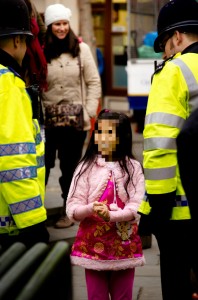Why Can’t the Police Keep Working With us to Support the Runaways?
The Police recently announced a change in approach when children are reported missing especially, where children are in care. An article published by the Guardian says:
…A radical new approach was being unveiled to target investigations on those at risk instead of responding to every call-out.
In future the definition of missing people will be changed to “absent” or “missing” after a risk assessment has been carried out by the police call handlers.
Police will not be sent to cases where young people or adults are defined as being “absent” – which often involves officers attending children’s homes when young people are half an hour late for a curfew.

At Brighton Therapy Service we support a number of very vulnerable children and young people who use running away as a form of acting out. Young people who are in children’s homes in their teenage years often feel a profound sense of not really belonging and not being able to cope with how things are for them. They might want to hurt other people in a rage or might want to self-harm but running is another way to manage impossible feelings. As long as there is someone there to catch the young person they can try falling, take the risk and run. But what if there was no-one out there who could be trusted? No-one to try to bring them home?
Running into Trouble
What horrors and even tragic end could follow if the young person who runs is no longer being returned by the police – just “absent” – does this mean as a society it is OK for our young people to be groomed by a paedophile perhaps, or by adults who misuse substances. There are so many risks out there. Only a few weeks ago another young adult disappeared from the streets of London and was never found Is this what we are prepared to tolerate now?
Understanding the Runaway Child
It seems to me there is a lack of understanding about what running away is like. Imagine your home is an institution with staff who change shift and you are no longer able to live with your family. Once the young person gains some independence running away perhaps after an argument, is so easy and becomes a bit of a habit. Running might be a way of saying to the adults who care, “See you do not control me after all.” In fact, control issues are so common in young people who have experienced severe neglect of abuse in their birth families it is very common for them to grow up wanting to challenging and take over.
But that does not mean they do not want to be rescued. In fact they crave security, being told someone cares after all and they can be brought home to a warm bed and food and people who know them. This is why the police role is so crucial.
Out there on the streets, feeling the adrenaline buzz of independence but also round the corner, so many dangers; adults who would use the young person if they can. It soon begins to feel scary and so lonely. But pride kicks in and the young person cannot go back asking to be taken back in and would try to brave it out, the fear and threats mounting.
Police: A Helpful Presence

photo credit: garryknight
Then the police can be the one helpful presence firm but fair, sensible, they are used to the challenge and suddenly as the dark shapes approach the child feels safety and they can try to be tough and use abuse but they know it is nothing compared to what the police must have experienced before. I have seen situations where it is only the police officer talking to the troubled youngster that can help them to see sense. I have also observed the comfort for carers knowing that the child is being searched for and the relief when they are returned . The young person may not be able to be grateful but thank goodness we live in a society where we have a caring police force….
…But do we any more?
Is this one more aspect of our culture which is being stripped away to save money? At Brighton Therapy Service we oppose the proposal that police time and money should be saved by calling runaways absent not missing and therefore no longer trying to find these lost and frightened young people.
Get in Touch
This was written by Rose and you can contact her here.
What do You think?
Maybe you know or work with children who run away or perhaps have runaway yourself? If you want to add a comment use the form below. We would love to hear your thoughts.




Comments